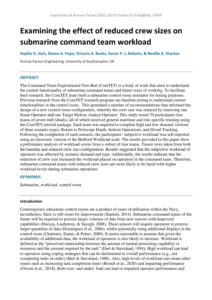| Document | Author Sophie G. Hart, Kiome A. Pope, Victoria A. Banks, Aaron P. J. Roberts & Neville A. Stanton |
| Abstract The Command Team Experimental Test-Bed (ComTET) is a body of work that aims to understand the current functionality of submarine command teams and future ways of working. To facilitate their research, the ComTET team built a submarine control room simulator for testing purposes. Previous research from the ComTET research program ran baseline testing to understand current functionalities in the control room. This generated a number of recommendations that informed the design of a new control room configuration, whereby the crew size was reduced by removing one Sonar Operator and one Target Motion Analyst Operator. This study tested 70 participants (ten teams of seven individuals), all of which received general maritime and role-specific training using the ComTET tutorial package. Each team was required to complete high and low demand versions of three scenario types: Return to Periscope Depth, Inshore Operations, and Dived Tracking. Following the completion of each scenario, the participants’ subjective workload was self-reported using an electronic version of the Bedford Workload scale. The results provided in this paper show a preliminary analysis of workload scores from a subset of four teams. Teams were taken from both the baseline and reduced crew size configuration. Results suggested that the subjective workload of operators was affected by scenario demand and type. Additionally, the results indicate that the reduction of crew size increased the workload placed on operators in the command team. Therefore, submarine command teams with reduced crew sizes are more likely to be faced with higher workload levels during submarine operations. |

